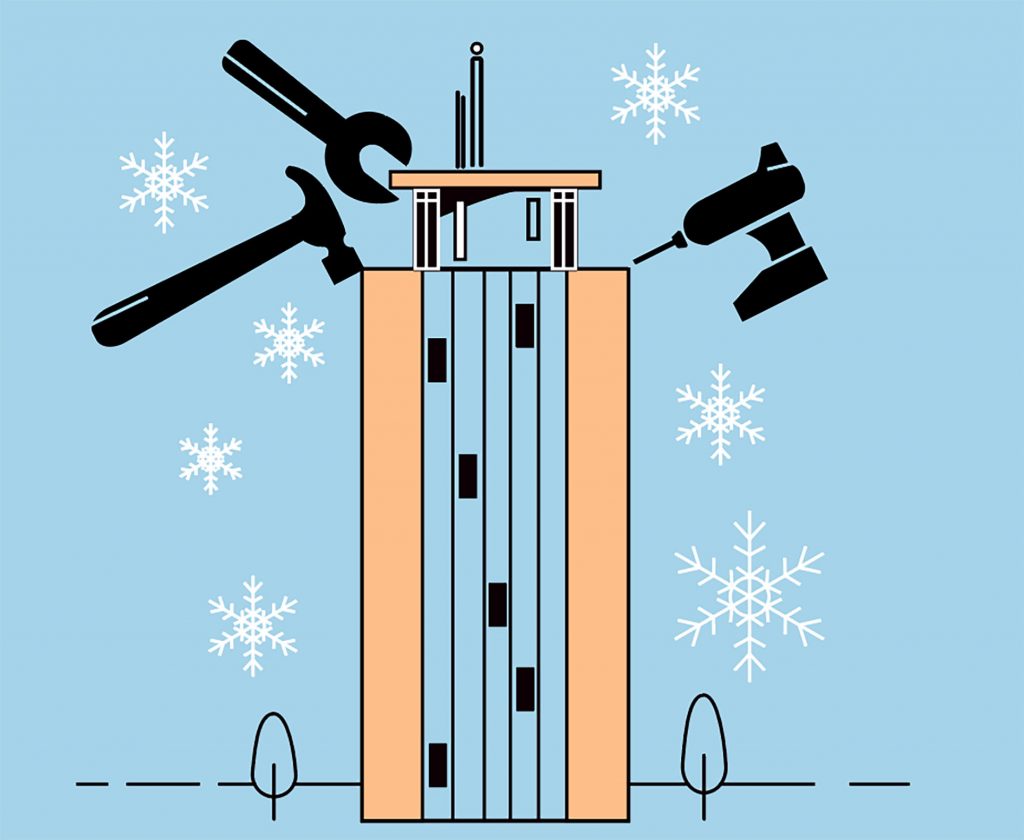As students begin replacing summer clothes with sweaters, Binghamton University is preparing for yet another snowy season.
While the National Oceanic and Atmospheric Administration (NOAA) has predicted that this year’s winter will be warmer than the last, it will also contain slightly more precipitation, raising concerns among students who utilize campus roads and parking lots.
Samir Rahimy, a senior majoring in business administration, said he has lived on campus for the past three years, and commended the University on their responses to snow in the past. Older students may recall being snowed in by Hurricane Stella in 2017, during which several cleanup employees worked more than 80 hours in a week to keep campus roads open.
“I thought BU did a great job clearing snow, but I would just park at Appalachian [Collegiate Center] and not drive much because of ice,” Rahimy said.
Kiernan Fischer, a sophomore majoring in political science, was also supportive of the University’s past efforts to manage the snowfall, though she voiced concerns about commuters’ safety, given the University’s reluctance to cancel classes last year.
“While the University did a good job cleaning up snow in general, it did feel a bit slippery and there were times I felt commuters would have a difficult time reaching the campus if it remained open,” Fischer said.
David Husch, director of transportation at the University, suggested that students take time to prepare themselves for commuting in the snow.
“Students should plan ahead when bad weather is in the forecast and allow themselves more time for their daily commute,” Husch said. “For those that drive to campus, more time will be needed to clean off your vehicle and safely navigate slippery conditions.”
While commuting in the snowy season may be difficult, Husch reminds students of the campus-provided alternative — Off Campus College Transport (OCCT) buses.
“If classes are canceled during the day, OCCT does their best to provide service for a few additional hours in order to get everyone home,” Husch said. “For those taking a bus to campus, plan ahead and take an earlier bus so you can ensure you get to class on time. During bad weather, buses may run behind.”
OCCT Director Raul Avalos extends OCCT hours to accommodate students after classes are canceled, but also cautions his bus drivers during the snowy season.
“During snowfall, I ask my drivers to keep safety at the forefront of their minds,” Avalos said. “Safety is our top priority and comes before thinking about making it to a destination on time. I tell them to follow a safe speed and to practice caution when going up and down hills.”
On campus, snow clean-up operations are handled by Physical Facilities. Tanya Husick, executive director of Transportation and Parking Services (TAPS), praised the department on its past efforts, and warned students of the restrictions placed on campus parking during the winter.
“Physical facilities does a great job clearing the parking lots and bus stops for the campus community,” Husick said. “During the winter months, it is even more important to remember that during snowfall, vehicles are prohibited from parking in commuter lots between midnight and 5 a.m. In addition, the visitor’s paid lot, Lot LT and Lot J1 need to be empty between 5 [a.m.] and 7 a.m. if the green light is on. These rules are in place to keep the commuter lots cleared of snow.”
Students need to be wary of these restrictions, as any vehicles breaching these terms will be towed and ticketed a $40 fine when snow is expected overnight, according to the TAPS website. Husick said students wishing to stay overnight can park in available 24-hour ‘R’ lots. The TAPS website provides a map of parking lot options for students.
The threat of the not-so-far-away snowy season continues to loom over campus. Students such as Ned Rozell, a senior majoring in biology, prefer taking it upon themselves to remain prepared.
“Just drive slow,” Rozell said. “It can snow really hard at times and the school last year was adamant not to close.”



